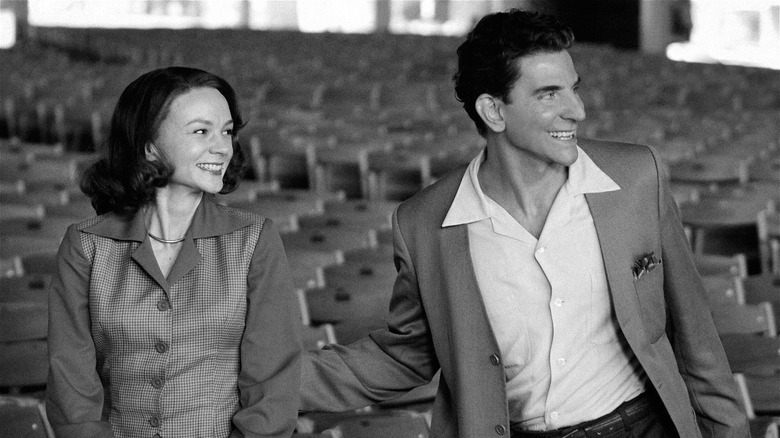Maestro Review: A Work Of Pure Showmanship
- Powerful performances from Bradley Cooper and Carey Mulligan
- Dynamic directorial style
- At times Bradley Cooper's choices can come across as self-indulgent
Bradley Cooper wants an Oscar. He wants one really bad. This is no secret to anyone. But with his work in "Maestro," he might just deserve one. In this broad, soaring biopic, he examines the personal and professional life of Leonard Bernstein, one of America's greatest conductors and composers. While it shines its light on Bernstein, it's unafraid of delving into his very real flaws, championing his genius but being unsentimental about the difficulties he posed for those around him. There's a sense of fluidity and lyricism to the production that captures the spirit of Bernstein, helping "Maestro" to overcome the limitations of the genre, which often traps viewers in a play-by-play recreation of its subject's life. With stirring performances from both Cooper in the lead role and Carey Mulligan as his long-suffering wife, "Maestro" tells a story of the kind of talent that brings tremendous joy but also threatens to suffocate anyone who's too close to it for too long.
The youngest conductor in New York Philharmonic history, Leonard Bernstein is on the fast track to success beyond his wildest dreams. He has a passion for music of all shapes and sounds, and he both conducts and composes with a frenetic energy that can't help but rouse the spirits of anyone who listens to him. His attitude towards life is equally ebullient, as he bandies praise and forms attachments quickly — too quickly — to those who enter his orbit. Of particular fascination to Bernstein is the beautiful young actress Felicia Montealegre (Mulligan), and the two begin a relationship that is as long-lived and devoted as it is emotionally compromised. Bernstein loves deeply, but his feelings are fickle, and he sees no inherent contradiction in his ability to adore Felicia yet bed any man or woman who catches his fancy.
As much as "Maestro" is about Bernstein's life and career, its empathetic treatment of Felicia also poses the question of the cost of loving him. What must someone sacrifice in order to reach such rarified air, and can anyone survive such a relationship without it breaking their spirit?
A fluid visual palette
In the role of Leonard Bernstein, Bradley Cooper injects old-fashioned movie star energy into his occasionally manic musical legend. But while his performance is strong — unnecessary facial prosthetics aside — he really shines as a director. The success of "Maestro" is largely down to his ability to bring a unique visual flair to the production, allowing it to be — like Bernstein himself — many different things at once. Some moments play out as a musical fantasy, like when Bernstein is showing Felicia a staged reproduction of some of his works as a composer.
We get extended sequences of Bernstein conducting, allowing the music and his energetic performance to speak for itself. But there are also parts of the film that are purposefully more subdued, creating a powerful emotional resonance from understated visual elements. The sheer theatricality of its on-stage sequences is balanced out by the gentler relationship drama between Bernstein and Felicia as they navigate a marriage with many partners: there's not just Bernstein and Felicia, but Bernstein's larger-than-life presence and his numerous lovers.
Carey Mulligan's understated power
Although Leonard Bernstein is undeniably the star of the show — everyone else, after all, merely exists in his shadow — Carey Mulligan as Felicia is the beating heart of "Maestro." Throughout the entire film, she is understated and ever-present in their relationship, despite its many complications. The way that the camera — often frenetic in other moments of the film — gives her its full, undivided attention during her moments of pain and suffering makes it clear where its sympathies lie. For her part, Mulligan is utterly magnetic in the role, her monologues giving the audience no choice but to hang on her every word. In a way, we see Bernstein through her eyes, as she bears witness to both his incomparable talents and the way that they consume everything in their path. When Bernstein is in a room, there's little space for anyone else, and so irrepressible is his energy that those around him have little choice but to bend to his impulsive whims.
It's a testament to "Maestro" that the film works equally well as a relationship drama and a biopic exploration of a once-in-a-generation genius. The film features gloriously dramatic sequences of Bernstein's spellbinding work as a conductor and emotionally devastating scenes between Bradley Cooper and Mulligan that have a quiet power all their own. "Maestro" may be a prestige drama with Oscar bait written all over it, but it's hard to deny its charm and craftsmanship, elevating it above many other films of its genre. A work of pure showmanship, "Maestro" proves Cooper's ability as not just a performer, but as a talented filmmaker in his own right.
"Maestro" is currently showing in theaters and will arrive on Netflix on December 20.


